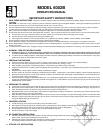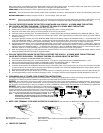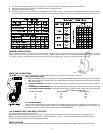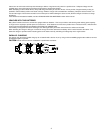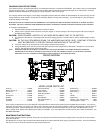
5
CHARGING SULFATED BATTERIES
If your battery has sat in the discharged state for an extended period of time, it can become SULFATED. This usually is seen as a white deposit
near the top of the battery. The sulfate is formed when a battery with low water levels remains discharged for an extended time. Sulfated
batteries exhibit the characteristic of accepting no charge regardless of the rate of charge.
The charging method is two staged. The first stage of attempting to break down the sulfation to allow the battery to accept a charge must be
closely watched to avoid excessive charge rates as the battery begins to charge and overheating. The second stage is a slow charging to
restore the battery to full charge.
READ AND FOLLOW ALL PRECAUTIONS AND WARNINGS IN YOUR INSTRUCTION MANUAL BEFORE ATTEMPTING TO CHARGE SULFATED
BATTERIES. FAILURE TO OBSERVE THESE WARNINGS MAY RESULT IN PROPERTY DAMAGE OR SERIOUS PERSONAL INJURY OR DEATH.
To recharge a sulfated battery:
1. Attach the battery clamps as described in the instruction manual.
2. Always use the chargers lowest rate when turning the charger on. Set the charger to the chargers highest rate for the voltage of
the battery being charged.
CAUTION: NEVER CHARGE A BATTERY AT VOLTAGES RATES ABOVE THAT OF THE BATTERY.
3. The battery will show little or no amperage at the start of the charging process. This will continue until the sulfation begins to break
down.
CAUTION: AS THE SULFATION BREAKS DOWN, THE AMPERAGE MAY RAPIDLY RISE. CONSTANT ATTENTION
MUST BE OBSERVED TO PREVENT SERIOUS OVERHEATING OF THE BATTERY.
4. Lower the charge rate to the lowest rate for the voltage of battery being charged.
5. Charge the battery at this low rate until the electrolyte reaches the fully charged state as described in the tables in your instruction
manual. This may take as long as two or three days.
NOTE: SOME BATTERIES MAY BE SO BADLY SULFATED THEY CAN NOT BE RESTORED TO A NORMAL OPERATING CONDITION,
REGARDLESS OF THE RATE OF CHARGE OR THE LENGTH OF TIME THE CHARGE IS APPLIED. IF THE BATTERY CANNOT BE
RESTORED TO A FULLY CHARGED CONDITION BY A SLOW CHARGING, IT SHOULD BE REPLACED.
WIRING DIAGRAM
MODEL 6002B PARTS LIST
Front leg .................... 610864
Wheels w/nuts (2) ............ 610091
Axle w/nuts ................. 605673
Base ....................... 605186
Transformer ................. 610398
Rectifier .................... 610100
Fan Blade
...................
610189
Fan Motor
...................
610190
AC Circuit Breaker ............ 610397
Timer w/knob ................ 610389
Switch w/knob ............... 605675
Amps Charge Meter ........... 605204
AC Cord .................... 605205
DC Cable Set ................. 605207
DC Circuit Breaker (1)
..........
610069
Top Panel
...................
610539
Side Panel (1) ................ 605209
Front Panel (1) ............... 610643
Back Panel (1) ............... 610644
Lid ......................... 605211
Handle ...................... 605213
Stop/Go Lite ................. 604579
Clamps (1 pair, includes jaws)
.....
6202
Jaw kit(repairs 1 clamp)
..........
6204
Parts may be purchased from your local authorized service depot listed in the Service Procedure manual supplied with your product. If you elect to
order parts from the factory you may do so by mail or phone. Minimum order from the factory is $25.00. Orders received that are under the minimum
will not be processed. Taxes and freight are extra and are not considered to be part of the dollar value of the order. We do not have a C.O.D.
policy. Cashier check, Money order, Mastercard or VISA are acceptable. If you use a Mastercard or VISA send only the number and expiration. DO
NOT SEND THE CARD.
MAINTENANCE INSTRUCTIONS
Worn clamps and jaws should be replaced. Worn parts can lead to poor connections and present a safety hazard. See parts list for part number
of jaw and clamp kits.
Any Maintenance or repair of this unit that involves disassembly of the cabinet should be done only by a qualified serviceman. Incorrect reassembly
may result in a risk of electric shock when the unit is subsequently used.



